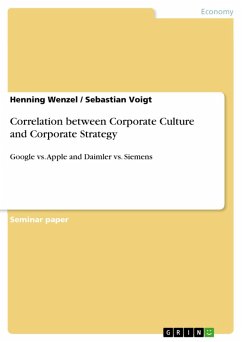
Correlation between Corporate Culture and Corporate Strategy (eBook, PDF)
Google vs. Apple and Daimler vs. Siemens
Versandkostenfrei!
Sofort per Download lieferbar
Statt: 27,95 €**
18,99 €
inkl. MwSt. und vom Verlag festgesetzt.
**Preis der gedruckten Ausgabe (Broschiertes Buch)
Alle Infos zum eBook verschenkenWeitere Ausgaben:

PAYBACK Punkte
0 °P sammeln!
Seminar paper from the year 2013 in the subject Business economics - Business Management, Corporate Governance, grade: 1,7, University of applied sciences, Cologne, course: Strategic Corporate Management, language: English, abstract: The character of a company¿s culture or work climate is gaining in importance. Culture is a product of the core values and business principles that executives espouse, the standards of what is ethically acceptable and what is not, the work practices and behaviours that define "how we do things around here", its approach to people management and style of operating...
Seminar paper from the year 2013 in the subject Business economics - Business Management, Corporate Governance, grade: 1,7, University of applied sciences, Cologne, course: Strategic Corporate Management, language: English, abstract: The character of a company¿s culture or work climate is gaining in importance. Culture is a product of the core values and business principles that executives espouse, the standards of what is ethically acceptable and what is not, the work practices and behaviours that define "how we do things around here", its approach to people management and style of operating, the "chemistry" and the "personality" that permeates its work environment, and the stories that get told over and over to illustrate and reinforce the company¿s values, business principles, and traditions. A company¿s culture is important because it influences the organization¿s actions and approaches to conduct the business - in a very real sense, the culture is the company¿s "operating system" or organizational DNA. All in all, culture as a concept is difficult to define and differs from company to company. The crafting of a strategy represents a managerial commitment to pursue a particular set of actions in growing the business, attracting and pleasing customers, competing successfully, conducting operations, and improving the company¿s financial and market performance. Even companies with same strategic and business concepts and comparable success differ in their approaches regarding the corporate culture. What becomes clear is that there is a correlation between culture and strategy. Hence the consistency between strategy and culture is a long-term competitive advantage and a key to corporate success. To counteract preventive a possible misfit between the corporate culture and the strategy, consideration of corporate culture as part of the concept to strategy implementation is essential.
Dieser Download kann aus rechtlichen Gründen nur mit Rechnungsadresse in A, B, BG, CY, CZ, D, DK, EW, E, FIN, F, GR, HR, H, IRL, I, LT, L, LR, M, NL, PL, P, R, S, SLO, SK ausgeliefert werden.













